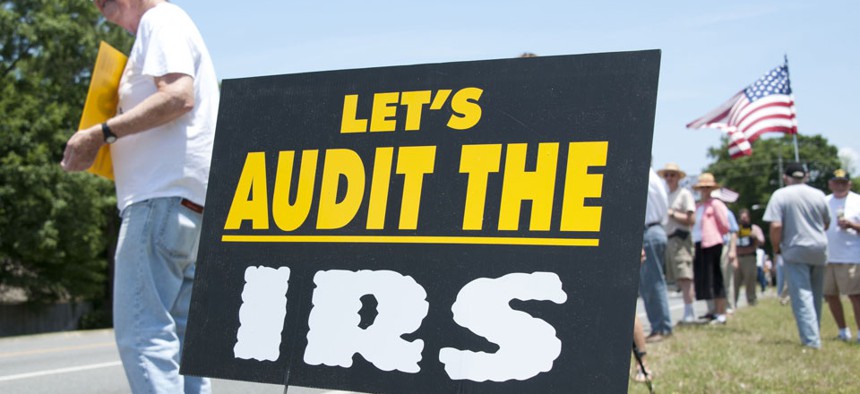
Tea Party protesters rally in front of local IRS in Florida in May. Cheryl Casey/Shutterstock.com
Remember the IRS Tea-Party Scandal? Get Ready for Round Two
Obama isn't talking about it, but his administration might restrain the activities of advocacy groups, including ones the IRS targeted last year.
Notably absent in President Obama's recent can-do talk about executive action has been a pledge to clean up campaign finance. But that doesn't mean his administration hasn't been doing anything about it.
Rather, the question is whether it will have the guts to see through the effort already underway.
The Treasury Department has been advancing a new rule that could radically constrain the actions of so-called 501(c)(4) groups—organizations that are the bane of progressive reformers because they often blur the line between education and outright political advocacy and don't have to disclose their donors.
The proposed rule has Republicans on Capitol Hill at battle stations while advocacy groups on both the left and the right besiege the Internal Revenue Service with objections and put pressure on the Obama administration to modify or suspend it. In particular, conservatives charge that the IRS now wants to legitimize the same sort of screening activity that led them to accuse the agency last year of targeting tea-party groups and other grass-roots advocates."Right now, the Obama administration is getting ready to codify the same kind of intimidation and harassment of its political opponents that stunned the nation last year," Mitch McConnell, the Senate's Republican leader, said on the floor last week. "And hardly anybody's talking about it."
That includes the White House, which has been silent about whether it favors the IRS rule change—leading some in the reform community to accuse it of standing by idly. Obama didn't even mention campaign finance reform in his national address last month, and inquiries to the White House on the matter were routed to Treasury.
For it's part, Treasury says the rule, which remains in its early stages, is an attempt to overhaul the 501(c)(4) procedures that sparked last year's uproar. And while the department would not address McConnell's criticisms, the proposed rule is written in a way that would affect liberal and conservative groups equally.
That's little tonic to Republicans. Last month, at the behest of Rep. Harold Rogers, R-Ky., the chairman of the House Appropriations Committee, the GOP inserted a provision in the House omnibus spending bill that would nullify the IRS rule's implementation. But Senate Democrats wouldn't agree, exacerbating conservative fears that the IRS measure targets them, and the language was stricken.
That's left the reform measure still in play at Treasury. Under current law, groups that qualify for nonprofit status under section 501(c)(4) of the IRS code must, as their main purpose, promote "social welfare" and cannot predominantly be dedicated to political activity. Longtime Washington organizations such as the National Rifle Association, the Sierra Club, AARP, and the League of Women Voters are organized under the section.
But the rise of nonprofit arms of groups with overt political aims, such as Priorities USA and Crossroads GPS, along with the bevy of smaller groups formed in advance of the 2012 elections, has made enforcement of the rule more pernicious. The new rule would expand the definition of what is considered "political activity" by the agency and would limit that activity to a set window close to Election Day.
The operational effect would knock scores of groups out of their cozy category. Moreover, Treasury is also considering whether to expand the new rule's limits on politicking to other entities organized under different sections of the code, such as the U.S. Chamber of Commerce.
Conservatives may be treated equally under the rule, but they're acting as if they have more to lose. Heritage Action, the advocacy arm of the Heritage Foundation, last month sent a letter to Congress signed by a mix of tea-party and social-conservative groups urging it to stop the "IRS power grab" and arguing that advocacy on health care, the budget, and other policy issues are "part of a social welfare mission."
Some trade groups, too, see the rule as going too far. "They're trying to limit contributions from the super PACs and in the process they're catching a lot of innocent folks," says Wayne Allard, the former Republican Colorado senator who now heads up government relations at the American Motorcyclist Association, who says the rule would inhibit the group's ability to communicate with its members.
The IRS is still taking public comment on the rule and likely will rewrite it in response. The groundswell of opposition from entrenched interests has reformers worried the administration will do little, and, at the very least, don't expect the rule to be finalized in time to affect the 2014 midterm elections—despite GOP fears to the contrary.
There's a precedent. Three years ago, the White House floated the idea of an executive order that would require federal contractors—including some of the nation's largest companies—to disclose their campaign activities. After an outcry from Republicans and big business, the order was junked just in time for the 2012 elections. "Quite frankly, the president stopped pushing it," says Craig Holman, a lobbyist for Public Citizen.
Despite all the talk about the president's "pen and phone," the White House hasn't shown any interest in reviving that order. And it hasn't done anything to embrace the IRS proposal—although given that many Republicans view Obama as engaged in a conspiracy to destroy the conservative grassroots network, that might be a good thing, Holman says.
That's where the president sits today with regard to campaign finance reform: Reviled on the left because he hasn't gone far enough, and on the right because they're afraid what he might do. All in all, it's a recipe for inaction in Obama's "Year of Action"—which may be, on this particular issue, how the White House likes it.
(Image via Cheryl Casey / Shutterstock.com)
NEXT STORY: Play of the Day: America Gets Distracted







